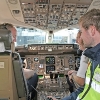
FAA Seeks Public Comment on Pilot Training Requirements
As part of Federal Aviation Administration’s (FAA) Call to Action to enhance airline safety following last year’s Colgan Air accident in Buffalo, N.Y., FAA has asked for recommendations to improve pilot qualification and training requirements.
“Our nation’s airlines should have the best-trained and best-prepared pilots in the cockpit,” said U.S. Transportation Secretary Ray LaHood. “We must build on the current pilot certification system and make it even stronger.”
“Experience is not measured by flight time alone,” said FAA Administrator Randy Babbitt. “Pilots need to have quality training and experience appropriate to the mission to be ready to handle any situation they encounter.”
The public will have 60 days to comment on basic pilot certification in four key areas:
- Should all pilots who transport passengers be required to hold an Air Transport Pilot (ATP) certificate with the appropriate aircraft category, class and type ratings? This would raise the required flight hours for these pilots to 1,500 hours.
- Should FAA permit academic credit in lieu of required flight hours or experience?
- Should FAA establish a new commercial pilot certificate endorsement that would address concerns about the operational experience of newly hired commercial pilots, require additional flight hours and possibly credit academic training?
- Would an air carrier-specific authorization on an existing pilot certificate improve safety?
FAA’s Call to Action aims to strengthen pilot hiring, training and performance, as well as combat fatigue and improve professional standards and discipline at all airlines. FAA is pursuing both rule changes and voluntary safety enhancements. One proposed rule, which will enhance airline pilot training programs, recently received more than 3,000 pages of public comments. FAA is now developing a supplemental proposal that will be issued this spring. FAA will also propose new rules this spring to address pilot fatigue.
The Advance Notice of Proposed Rulemaking (ANPRM) was published Feb. 8 in the Federal Register and will have a 60-day comment period. It is on display at http://www.faa.gov/regulations_policies/rulemaking/recently_published/. FAA will then incorporate the comments into a new proposal that will also be published for public comment.